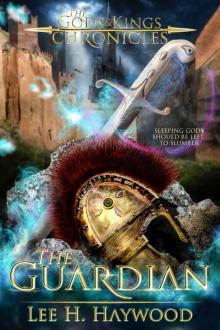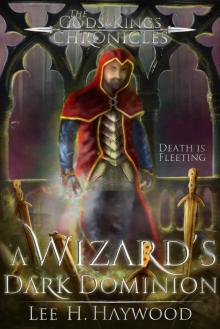- Home
- Lee H. Haywood
The Wayward Prince Page 2
The Wayward Prince Read online
Page 2
“But...” began Malrich.
“Buts don’t get you very far in this land.” The Dunie soldiers parted, and a dwarf clad in all black armor emerged from the crowd. “You ought to keep that in mind when you speak with King Iantir.” He shook both of their hands and introduced himself. “Sir Bilis Pride. I’m the master-at-arms of House Langlif.”
Emethius was a bit surprised to meet a Knight of Niselus this far west. A man of the cloth, such as the knight, might see right through Emethius’s and Malrich’s disguise, but it was too late to change stories now. “I am Master Emethius of the Tiber Brotherhood,” said Emethius, with a partial bow. “And this is...”
“Brother Malrich,” said Malrich.
“Aren’t you a bit old to be a leech boy?” asked Sir Bilis.
“The gods work in mysterious ways,” said Malrich, crossing himself in the gesture of the faithful.
“Ain’t that the truth,” said Sir Bilis. He gestured with his hand. “This way, gentlemen.”
Sir Bilis led them through a maze of narrow streets, each byway leading higher than the last as they progressed through the levels of the multi-tiered city. “The Cul stir in the Shadow, so Hardthorn was built tall,” explained Sir Bilis, as they went along. “Nearer to the sun and away from the creeping reach of the fog.”
Every building in the city seemed to abide by this rule. The homes and shops were all multi-storied, built one right alongside the next so that most neighbors shared a wall. It was easy to guess where all of the trees from the valley had gone. Most of the buildings had frames crafted from wood. No piece of exposed lumber was without ornamentation. Faces were carved into the heads of support beams. Banister railings were made to look like snakes. Pillars resembled bears and eagles. Wooden patios overhung the main road and created a canopy. The city was breathtaking, set as it was against the backdrop of snowcapped peaks.
Emethius would have expected to find the city overflowing with people, yet he saw hardly a soul. The few Dunie they did encounter all wore swords at their hips, women and men alike. They greeted Emethius and Malrich with grim and unwelcoming eyes. War wears down even the hardiest people, thought Emethius.
Built from a finger of stone atop the city’s highest terrace stood the citadel of Reel Aper. The watchtower closely resembled a lighthouse and served much the same purpose.
Sir Bilis pointed toward the flame leaping from the pinnacle of the watchtower. “The flame of Reel Aper burns night and day. It signals the surrounding lands that the wardens of the Barren Tracks have not faltered, and that the great enemy remains contained.”
“Contained where?” asked Malrich. “We heard Cul in the valley.”
“It has been a hard winter,” was all Sir Bilis would say in reply. “Here we are, King Iantir’s great hall.” The great hall adjoined the Tower of Reel Aper at the base. These two buildings stood out from all of the other buildings in Hardthorn, as they were the only two buildings constructed completely out of stone.
Emethius entered the great hall by ducking through a low and narrow walkway. This was a defensive measure, Emethius knew. It was awfully hard to fight your way into a building while hunched over like an invalid. The walkway opened up into a mammoth hall.
Several hundred could feast comfortably within. Tonight, most of the tables were empty, and only a few dozen soldiers were clustered about the wooden benches that ran along either side of the central aisle. They hungrily tore at hard bread and the seared carcasses of small game hens. The condition of their food was poor and the men looked malnourished. Emethius saw no signs of fruits or vegetables.
“A hard winter indeed, if this is the fare eaten by the king’s closest men,” whispered Malrich out of the side of his mouth.
A large fire burned near the center of the hall in a hearth so large, a spitted bull would have fit in the space. A mahogany chair, its back wreathed in eagle feathers, stood before the hearth. It was so near the flames, Emethius wondered how it kept from catching fire.
“King Iantir,” said Sir Bilis, speaking directly into the ear of the elderly man who sat stooped over on the throne. “Two men have arrived from Merridia. This is Master Emethius, a healer sent from the Tiber Order. He is accompanied by a leech boy.” Sir Bilis took up position directly behind the throne.
At first, the elderly king did not look up. His gaze was transfixed upon a crown that was resting in his lap. It was a plain and ordinary circle of iron, save for the jewel that beset its front — a single yellow diamond that was the size of a small child’s fist. King Iantir Langlif ran his thumb over the faceted surface of the stone, causing refracted firelight to cascade across the hall.
Emethius and Malrich waited in silence, standing as near to the fire as they could tolerate. Emethius could feel the waves of heat lashing against his clothes, and he imagined the hem of his fox fur robe would singe if he stood much closer.
“The fire keeps the chill away,” said King Iantir, perhaps sensing their discomfort. His voice was little more than a whisper and was nearly drowned out by the crackling fire. “There is no Shadow in the flame. It drives away the mist and silences the cackling calls of my foes. Fire is the only certainty in a world wreathed by darkness.”
“The Shadow creeps as it ever does,” said the king’s guards in unison.
“It was kind of your high lord to send us a healer in our time of need,” said the king. “It is hard to forget one’s own blood, no matter how far removed.”
“That it is,” said Emethius. The founding matriarch of the Langlif line was a Merridian princess, Emethius recalled. She was the love of Atesar, the story told in Emethius’s favorite poem, the Lay of Etro. “Merridia has not forgotten the Children of Ierra. High Lord Valerius sends you tidings of health and mirth, Your Grace.”
“Does he?” exclaimed the king. He turned toward Emethius, his stare causing Emethius’s knees to grow weak. Beside him, Malrich gasped. King Iantir’s eyes were gone, gouged from their sockets, leaving behind dark voided holes.
“I-I meant no offense with the comment,” stammered Emethius. He looked away, although who that benefited he could not say.
“You may not have meant any offense, but High Lord Valerius damn well did,” growled the king. “Did you come here to give me a new set of eyes? I’ll happily take the eyes of your leech boy, if that’s what you’re offering.” He blindly snatched toward Malrich’s face, which caused Malrich to shuffle back a step. The king frowned and turned back toward the fire. His face glowed red from the flames, save for his eye sockets, they remained dark pits.
Something awful has happened to this land, realized Emethius. He glanced at Malrich for support, but his companion could only shrug in response.
“My sincerest apologies, Your Grace, but we were dispatched before word of your plight reached Merridia,” said Emethius. Whatever the situation was in Dunis, he and Malrich still needed safe passage to the Sygian Mines. Without that, they might as well turn around and go home. He took on his most diplomatic tone of voice.
“The Blackheart is getting worse in Merridia,” continued Emethius, happily mixing the truth with lies. “Valerius’s own son has succumbed to the madness, and the high lord has taken a special interest in the affliction. We have been sent to investigate the impact of the Blackheart on your land, to learn how quickly the disease is progressing, and to record what treatments your people have found successful. Of course, my companion and I are not alone in this matter, other healers have been dispatched to the great cities of Emonia. I, personally, have been tasked with going as far as the Stygian Mines, with your leave, of course, but now I see that this may not be possible. I apologize for my ignorance. Were I aware of your current situation I would have been more... ah... delicate, Your Grace.”
King Iantir laughed bitterly. “The Blackheart does not exist in the land of Dunis. The Shadow holds no sway over the hearts of my men.” He stood, his face twisted with fury, and lurched in their direction. Emethius and Malrich stepped back, unsure of
King Iantir’s intent. “Three moons have passed since I sent High Lord Valerius word. Three moons have passed since the Cul took Interleads and the Mines of Stygia. Three moons have passed since the Cul fell into our valley and began attacking the gates of my city at night. Three moons have passed, and just now I receive High Lord Valerius’s reply — a healer and a leech boy with no army to their back and no supplies in their wagon. What use are you to me?”
The facts kept hitting Emethius like a hammer setting nails into his coffin. The Barren Tracks are not open. The Cul control the pass. There is no safe path into the Great Northern Ador. Meriatis is damned. He felt a wave of nausea overcome him, and he stood mute before the eyeless lord.
Malrich stepped forward, taking charge. “Our research into the Blackheart seems a trivial matter given the dire state of your land. If you grant us leave in the morning, we will return to Mayal with all haste and plead your case. High Lord Valerius is a reasonable and gracious lord, Your Grace.”
King Iantir laughed. “I have learned to take the promises of Merridians lightly. But if you insist, tell your high lord this. Our land is infertile, our larders are empty, and the wealth in our coffers is dwindling. We cannot buy food with stones, and we certainly can’t eat them. The Emoni have promised us grain, but they send us only a third of what we need. So my men go hungry, and the number of deserters grows every day. My people are boiling leather to get what nourishment they can. Babies are dying at the breast because their mothers can’t produce milk. The few farmers still working the land reap a harvest of dust. My country is fading, and in the evening the cackle of the Cul grows louder every night.” He spit at their feet. “We are the wardens of the west. When we fall, our plight will become the scourge of Eremel. Tell your high lord that. And until you return with an army ten thousand strong, curse your word, your high lord, and your people.” He waved to his men. “Take these fools from here. Feed them no better than what my own men receive, and throw them from the city as soon as the Shadow clears.”
Using the butts of their spears, the Dunie guards prodded Emethius and Malrich from the great hall and out into the cool mist-filled night.
The amicable grin had slipped from Sir Bilis’s face. “If you favor your life, I would recommend you have your lies sorted out before you come before the true King of Dunis, healer,” whispered Sir Bilis into Emethius ear.
“Lies? What lies?” demanded Emethius, still trying to stay in character as he was shoved along.
Half-a-dozen men emerged from the shadows of the great hall, all clad in black. One man came up behind Emethius and Malrich and took their swords and daggers, while another pair patted them over from head to foot. Malrich tried to resist the rough treatment until a man twice his weight locked an arm around Malrich’s throat. Emethius thought better of resisting and raised his hands in surrender. “Take us where you must.”
“There’s a good lad,” said Sir Bilis. “Now keep your mouth shut and don’t cause a fuss. I don’t fancy making a mess on these lovely streets — washing blood off of cobblestones ain’t easy. Hurry along now, we don’t have far to go.”
CHAPTER
II
THE FEARLESS RUNNER
The wooden planks of the dock groaned and creaked beneath Leta’s feet, while farther below the sea crashed, spraying white foam skyward. She had the unnerving impression she was walking into a fortress. She could feel the eyes of a hundred watchmen on her, although she only spied a few — dim outlines in the riggings of ships and shadowed faces peeking through portholes. The crew of every ship in the harbor seemed to be aware of her presence, though no perceptible alarm had been sounded.
This must be the most protected dock in the world, thought Leta as she walked farther and farther from shore.
Half a dozen ships were moored to the various branches of the dock, with more anchored in the open water of the harbor. A handful of the ships were large trading galleys, each graced with three banks of oars. These ships were designed to ply the narrow sea that nearly split Elandria in two. But most of the ships were war vessels, two dozen at least, with sleek bodies designed for speed. Some were painted blood red, while others were orange or yellow — a few were as blue as the sea. The grandest of the vessels was so black it seemed to swallow what little light remained in the dark of night. This was the Fearless Runner, the pride of Elyim, and the most famous ship in all of Merridia. It was also the capital ship of Lord Admiral Ferrus’s fleet.
The ship’s hull resembled polished jet. The only splash of color on the entire ship was its wooden figurehead which jutted from the prow like a battering ram. It was fashioned in the likeness of a ferocious golden osprey with a gaping jaw and lengthy wings that swept along either flank of the ship. Writhing eels dangling from the bird’s talons, dipping almost to the waterline.
Leta ascended the gangplank which joined the dock to the Fearless Runner. As she did, a small creak drew her vision skyward. A man sat astride the uppermost yard of the foremast, his legs bowed about the wooden plank like a man sitting astride a horse. He looked as comfortable as a cat in a tree, if not a tad more dangerous. A quiver of arrows dangled from the riggings beside him, and he held a bow in his hand. Not knowing what to do, Leta nodded to the man. He responded by nocking an arrow to his bowstring.
She looked away, pretending that the threat didn’t exist. “These men serve my family. I will not show fear,” Leta whispered to herself.
Three men were lounging on the deck, a roasting brazier at their center. In the red light of the smoldering coals she could detect that each man wore a cutlass at their hip. Their soft leather breastplates were festooned with ringlets of steel — Meriatis had once told her that men were not apt to wear steel plate on a ship lest they fall overboard and drown due to the weight of their armor.
The man she took as their commander regarded her with cold unwelcoming eyes. “Has the lady come to sell her wares to my men?” His companions snickered at the crude remark, and one of the men began to lift the hem of her skirt with a fire-poker.
Leta swatted the poker aside and took on a stern voice. “The lady has come to speak with the admiral.”
This caused the men to laugh, the archer in the riggings included.
“He’s not here,” said the man. He waved his hand back toward the shore. “This is a private dock. I ought to have you arrested for trespassing. Now get off my ship and back to your brothel, whore.”
Leta pulled off her left glove and drew her arm into the light of the brazier, revealing the pale white flesh of her hand. An audible gasp passed from every man’s mouth. “Tell the admiral that Priestess Leta Benisor demands an audience.” Leta slammed her heel into the deck to emphasize her command.
The men all stood at once, sending their stools clattering against the deck. “Priestess Leta, Your Grace.” The man who had lifted the hem of her dress bowed awkwardly, clearly not accustomed to the act. “I... ah... well.” His face had turned as red as the coals burning in the brazier.
“Lord Admiral Ferrus did not expect you,” chimed his companion. “He’s in a meeting with the crew. If you could wait one moment I will draw him out.” He bowed with an appropriate degree of grace and kissed the back of her hand. “I am Lieutenant Floren, Admiral Ferrus’s second in command. If I may be so bold as to ask, why are you here? The admiral will want to know. Rarely does a person of such prestige visit our quaint ship.”
“More like never,” snickered his companion.
Lieutenant Floren cut off the man’s laughter with his stare.
“I will not wait,” said Leta, taking on the stern voice she used when giving orders in her monastery. “Nor will I share my purpose with an underling of the admiral. Take me to Admiral Ferrus at once.”
Lieutenant Floren looked to his companions for support, but both men were already shuffling aside; they clearly didn’t wish to partake in this conflict of interest — Admiral Ferrus was their commander, but Leta was the daughter of the high lord.
Th
e lieutenant acquiesced with a gracious smile. “Please, follow me, priestess.” He led Leta below deck.
This somehow feels too easy, thought Leta, suddenly fearful that she had walked into a trap. She was supposed to be asleep in her apartment — no one knew she was here. If these men were truly associated with the rebellion, they would not hesitate to take her captive, or worse.
Every one of her senses came on guard; the caustic stench of mildew stung her nose, the coarse threads of the rope railing grated against her fingers as she descended the stairs, the pitch blackness of the ship’s hold caused her pupils to flare wide.
Why is it so dark down here? wondered Leta, her unease growing. I’ve been in caves that were better lit. She tried to quell her rising panic, reminding herself that open flames were rarely welcome on a ship. She had to stay calm. Admiral Ferrus and Meriatis were once good friends. That thought only furthered her disquiet. Who better to be a rebel than Meriatis’s childhood friend. Leta cursed under her breath. What kind of fool walks into a rebel’s den?
A voice in the back of her head told her to run. She might manage to escape the ship, but she doubted she could run the length of the dock before one of the sentries put an arrow in her back.
Lieutenant Floren led her down another flight of stairs, which put them below the waterline. They passed down a long open space with rows of hammocks hanging on either side of the path. Only a handful were occupied.
This is the crew’s quarters, but where’s the crew?
At the end of the passage was a door, its edges wreathed in glowing light. There was a loud thump on the other side of the door, followed by a wretched cry of pain.
“Oh, gods.” She wavered, and was certain she had to flee, but before she could go two steps, Lieutenant Floren reached out and grabbed her hand with his vice-like grip.
“This way, please. The admiral would have my head if you injured yourself stumbling about in the dark.”

 The Wayward Prince
The Wayward Prince Fractured Throne Box Set 1
Fractured Throne Box Set 1 The Guardian (The Gods and Kings Chronicles Book 2)
The Guardian (The Gods and Kings Chronicles Book 2) The Guardian Stone (The Gods and Kings Chronicles Book 3)
The Guardian Stone (The Gods and Kings Chronicles Book 3) A Wizard's Dark Dominion (The Gods and Kings Chronicles Book 1)
A Wizard's Dark Dominion (The Gods and Kings Chronicles Book 1)